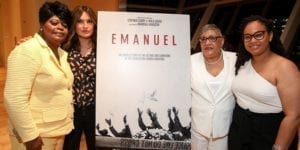“Darkness cannot drive out darkness; only light can do that. Hate cannot drive out hate; only love can do that,” said Rev. Dr. Martin Luther King, Jr.

I do not really know how to write about a subject like this. I feel emotionally overwhelmed and severely unqualified. Yet, the makers of the new documentary, “Emanuel,” manage to not only talk about the tragic Charleston church shooting but to also show the reality of the event in a historical context while telling the personal stories of both the victims and the survivors.
On June 17th, 2015, the city of Charleston — with its regrettable history as a major slave port — and the people of Charleston were unexpectedly shaken with violence and terror when a 21-year-old white supremacist gunned down members of the Emanuel AME Church. The killer entered the church during a Wednesday evening Bible study, and he was graciously invited to join them. However, during the closing prayer, the killer would open fire and murder nine people.
Churches are meant to be spaces of peace and sanctuary; a place to come together in unity. Therefore, sadly, churches have always been a target for terrorism. The act was evil, senseless and demonic even. The depth of the darkness and depravity of the human condition can be staggering. And yet, “Emanuel” clearly sets out to also tell a story of hope, resilience and redemption.
Perhaps the most surprising and controversial outcome of the terrorist attack was in the church members’ response as many of them would look the killer in his unempathetic face and say, “I forgive you…” Somehow, despite losing loved ones in a most horrible way, many were able to find, like Dr. King, the courage and strength to love. They found that the power of forgiveness is in its ability to bring freedom—not simply to the forgiven—but freedom to those who forgive. That somehow, hope still blooms from scorched, broken earth.
Emanuel tells an intimate story of the victims and the survivors. Survivors like Nadine, Anthony, Felicia, Polly and Chris. The documentary is emotionally stirring and powerful. For some, it will be intensely heart wrenching. Others may find it surprisingly cathartic. It is a film that is at times uncomfortable in its honesty, but it is a film that needs to be seen. We need to see it so we can continue to share the story. And we need to see it so we can always remember. Remember those like:
- Clementa Pinckney (07/30/1973 – 06/17/2015)
- Daniel Lee Simmons Sr. (07/16/1940 – 06/17/2015)
- Susie Jackson (01/28/1928 – 06/17/2015)
- Cynthia Graham Hurd (06/21/1960 – 06/17/2015)
- Sharonda Coleman Singleton (09/24/1970 – 06/17/2015)
- Depayne Middleton (12/15/1965 – 06/17/2015)
- Myra Singleton Thompson (12/05/1955 – 06/17/2015)
- Ethel Lance (08/30/1944 – 06/17/2015)
- Tywanza Sanders (07/23/1988 – 06/17/2015)
Marking four years since the tragedy, Emanuel will be in theaters for a special showing on June 17 and 19. Part of the proceeds from the documentary will be donated to the survivors of the shooting and the families of the victims.
For more information or to purchase tickets, visit: www.emanuelmovie.com.
Finley lives in central Florida with his wife and their foster children. You can read his blog at finleywalker.blog or email him at: [email protected]

Comments